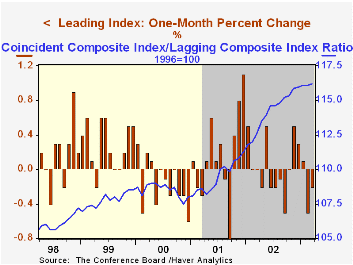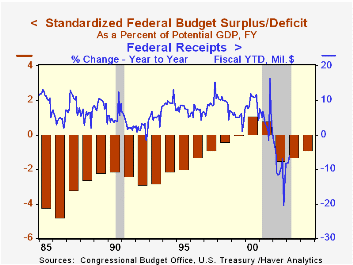 Global| Apr 21 2003
Global| Apr 21 2003Leading Indicators Down for Second Month
by:Tom Moeller
|in:Economy in Brief
Summary
The Conference Board reported that the Composite Index of Leading Economic Indicators fell 0.2% last month, as expected. The prior month's previously reported decline was revised slightly deeper. Gains amongst the leaders' component [...]

The Conference Board reported that the Composite Index of Leading Economic Indicators fell 0.2% last month, as expected. The prior month's previously reported decline was revised slightly deeper.
Gains amongst the leaders' component series improved slightly to 45%, but the breadth of gain amongst the leading series was revised narrower to just 30% in February. The percentage of leading components rising over a six month period rose slightly to a sub par 40%.
Lower building permits and higher initial claims for jobless insurance had the largest negative influences on theMarch leading index. The influence of most other components was near zero.
The Leading index is based on eight previously reported economic data series and two that are estimated.
The coincident indicators were unchanged, but were revised down in February. For 1Q, the coincident indicators rose 0.5% (AR) versus 4Q. During the last twenty years there has been an 80% correlation between the quarterly change in the coincident indicators and quarterly growth in real GDP.
The ratio of coincident-to-lagging indicators rose slightly to a new high. The ratio is an indicator of excess relative to actual economic performance.
Visit the Conference Board's site for coverage of leading indicator series from around the world.
| Business Cycle Indicators | Mar | Feb | Y/Y | 2002 | 2001 | 2000 |
|---|---|---|---|---|---|---|
| Leading | -0.2% | -0.5% | -0.4% | 2.1% | -0.9% | 1.0% |
| Coincident | 0.0% | -0.2% | 0.7% | -0.2% | -0.4% | 3.4% |
| Lagging | -0.1% | -0.2% | -2.5% | -4.4% | -1.3% | 2.8% |
by Tom Moeller April 21, 2003

The US budget deficit for the first six months of FY03 was the largest on record. At $252.65B, the federal government's red ink surpassed last fiscal year's first six months deficit of $131.92B.
The Congressional Budget Office forecasts a $286B deficit for this fiscal year.
Timing issues caused last month's deficit to narrow somewhat to $58.71B from $64.24B March last year. Consensus expectations had been for a deficit of $62.5B.
Net receipts for the first six months of FY03 fell 6.1% versus last year. Individual tax payments fell 6.8%. Corporate income taxes were down 43.1%. Social insurance contributions were up 1.8%.
Federal expenditures rose 6.6% versus last fiscal year's first six months. Defense spending was up 12.7%. Spending on health programs rose 9.8% and spending on education rose 29.1%. Spending on income security was up 11.1% and Medicare outlays rose 10.4%. On the weak side were Social Security outlays, up 4.0%, and interest expense which fell 7.4% y/y.
| US Government Finance | Mar | Feb | Mar '02 | FY2002 | FY2001 | FY2000 |
|---|---|---|---|---|---|---|
| Budget Balance | $-58.7B | $-96.3B | $-64.2B | $-157.8B | $127.3B | $236.4B |
| Revenues | $120.4B | $89.5B | 8.2% | -6.9% | -1.7% | 10.8% |
| Outlays | $179.1B | $185.8B | 2.1% | 7.9% | 4.2% | 5.1% |
Tom Moeller
AuthorMore in Author Profile »Prior to joining Haver Analytics in 2000, Mr. Moeller worked as the Economist at Chancellor Capital Management from 1985 to 1999. There, he developed comprehensive economic forecasts and interpreted economic data for equity and fixed income portfolio managers. Also at Chancellor, Mr. Moeller worked as an equity analyst and was responsible for researching and rating companies in the economically sensitive automobile and housing industries for investment in Chancellor’s equity portfolio. Prior to joining Chancellor, Mr. Moeller was an Economist at Citibank from 1979 to 1984. He also analyzed pricing behavior in the metals industry for the Council on Wage and Price Stability in Washington, D.C. In 1999, Mr. Moeller received the award for most accurate forecast from the Forecasters' Club of New York. From 1990 to 1992 he was President of the New York Association for Business Economists. Mr. Moeller earned an M.B.A. in Finance from Fordham University, where he graduated in 1987. He holds a Bachelor of Arts in Economics from George Washington University.
More Economy in Brief
 Global| Feb 05 2026
Global| Feb 05 2026Charts of the Week: Balanced Policy, Resilient Data and AI Narratives
by:Andrew Cates






